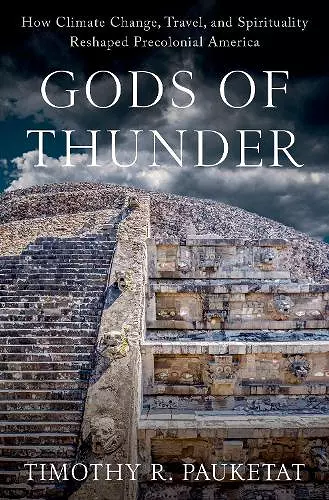Gods of Thunder
How Climate Change, Travel, and Spirituality Reshaped Precolonial America
Format:Hardback
Publisher:Oxford University Press Inc
Published:10th Jul '23
Should be back in stock very soon

A sweeping account of Medieval North America when Indigenous peoples confronted climate change. Few Americans today are aware of one of the most consequential periods in North American history--the Medieval Warm Period of seven to twelve centuries ago (AD 800-1300 CE)--which resulted in the warmest temperatures in the northern hemisphere since the "Roman Warm Period," a half millennium earlier. Reconstructing these climatic events and the cultural transformations they wrought, Timothy Pauketat guides readers down ancient American paths walked by Indigenous people a millennium ago, some trod by Spanish conquistadors just a few centuries later. The book follows the footsteps of priests, pilgrims, traders, and farmers who took great journeys, made remarkable pilgrimages, and migrated long distances to new lands. Along the way, readers will discover a new history of a continent that, like today, was being shaped by climate change--or controlled by ancient gods of wind and water. Through such elemental powers, the history of Medieval America was a physical narrative, a long-term natural and cultural experience in which Native people were entwined long before Christopher Columbus arrived or Hernán Cortés conquered the Aztecs. Spanning most of the North American continent, Gods of Thunder focuses on remarkable parallels between pre-contact American civilizations separated by a thousand miles or more. Key archaeological sites are featured in every chapter, leading us down an evidentiary trail toward the book's conclusion that a great religious movement swept Mesoamerica, the Southwest, and the Mississippi valley, sometimes because of worsening living conditions and sometimes by improved agricultural yields thanks to global warming a thousand years ago. The author also includes a guide to visiting the archaeological sites discussed in the book.
Readers interested in pre-Columbian North America will be enlightened by this bold study. * Publishers Weekly *
A grand narrative of the thousand years in North America before Columbus. Blends Native accounts and cosmologies, and archaeology, and ethnohistory. A landmark for the deep history of our continent * Stephen H. Lekson, University of Colorado *
This remarkable work of synthesis demonstrates the power of archaeological research in bringing to light key social and ecological transformations in North America, between 800 and 1300 AD; the results are truly staggering and place the contemporaneous history of medieval Eurasia in an entirely new perspective. * David Wengrow, Institute of Archaeology, University College London *
Pauketat offers a complex and extraordinarily rich narrative detailing how Indigenous peoples of ancient America celebrated and ritualized water as a response to climate change. He entangles seemingly disparate peoples of ancient North and Central America by making climatic events and processes - such as the evapotranspiration cycle and the Medieval Warm Period - as key actors in the histories of the ancient Maya, Aztec, and Mississippian peoples. And by exploring these processes within the ontological dimensions of Indigenous experience, Pauketat masterfully demonstrates the intersections of spirituality and science, or what contemporary Indigenous peoples describe as traditional ecological knowledge. In doing so, he makes clear that the language of water rights and movements such as Mní Wičhóni (Water is Life) have a much deeper past in which climate history has always been human history. * Patrick Bottiger, Kenyon College *
Finally, after decades of sidestepping by archaeologists, Pauketat has finally brought to light the question of interaction between Mesoamerica and the American Bottom city of Cahokia. Even at present, extensive research in archaeology is focused on the ties between Northwest Mexico and the American Southwest, while we have been waiting for someone to break the ice on the fundamental problem of Mesoamerica's possible connections beyond its northeastern frontier. Pauketat takes the reader on a personal journey as he delves into this perplexing inquiry with a sharp mind that arrives at fascinating insights and conclusions. * Peter F. Jimenez, author of The Mesoamerican World System, 200-1200 CE *
The book is a rich assemblage of sources and stories, giving a vivid impression of the ritual practices of 'Medieval America' and beyond and brings forth many thought-provoking ideas. * Antiquity *
The author and Oxford University Press should be commended for broadening our methodological approach to North American ancient cultures and history with this volume. * Minerva Magazine *
This volume will be valuable for archaeologists and their students involved in the study of the effects of climate change on the prehistory of North America. * Choice *
This accessible and well-written travelogue boldly frames the hypothesis that late medieval Indigenous eastern North Americans embraced rain-bringing wind gods, originally conceived in Mesoamerica, along with maize agriculture. * American Antiquity *
Enchanting... A bold provocation, couched in energetic prose and cast in a deeply informed sweep across ancient North America... Shake[s] us from long standing ideas about the cultural boundness of Pre-Columbian Indigenous polities and peoples. * Journal of Southern History *
- Winner of Finalist, 2024 PROSE Award.
ISBN: 9780197645109
Dimensions: 236mm x 164mm x 30mm
Weight: 612g
352 pages